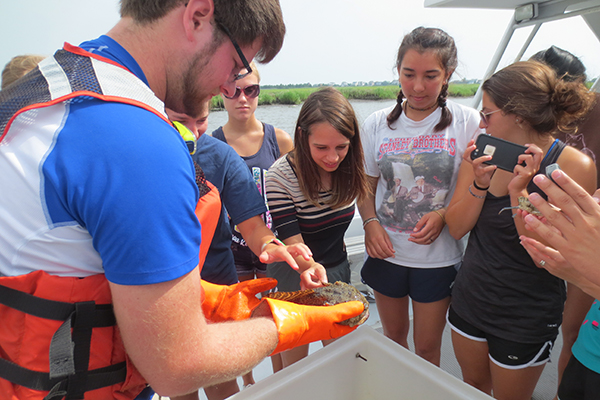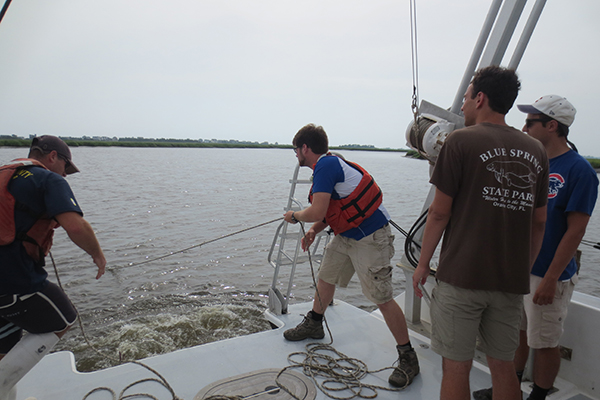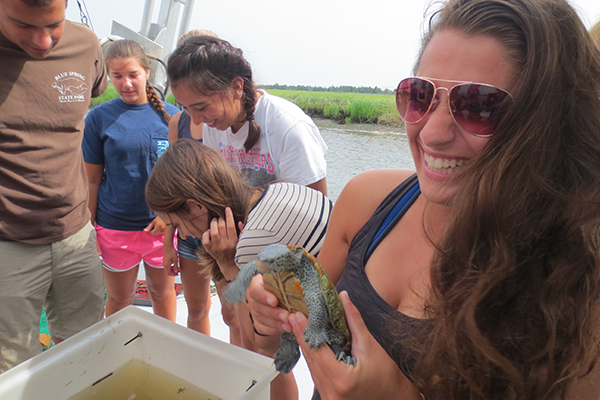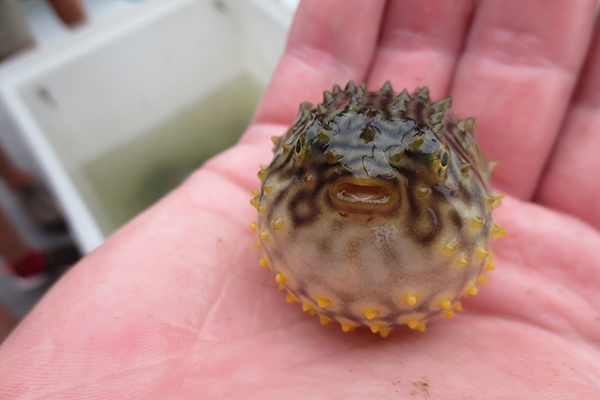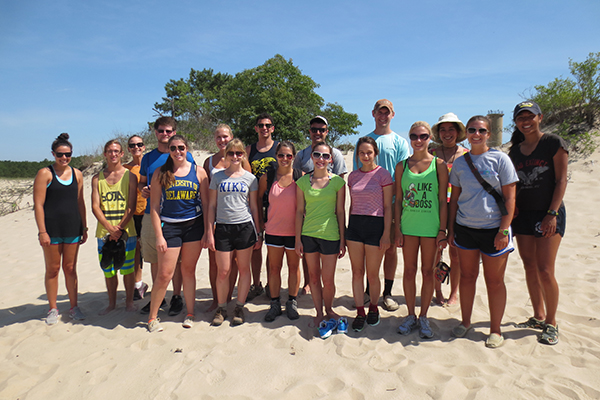

Shore futures
UD program engages undergraduates in unique marine research opportunities
11:26 a.m., Sept. 15, 2015--Time literally flew this summer in the University of Delaware lab where Isabelle Rew examined ancient samples of Foraminifera, single-celled marine organisms with calcium carbonate shells, under a microscope.
“Sometimes little bits of dirt would blow off the top of a finished sample, and I’d just think, ‘Oh my gosh, that’s 200,000 year old dust floating to the floor,’” said Rew, a senior geology and literature double major at Oberlin College in Ohio.
Research Stories
Chronic wounds
Prof. Heck's legacy
Rew spent this summer participating in UD’s 10-week marine sciences Research Experiences for Undergraduates (REU) program in the College of Earth, Ocean, and Environment.
She was one of 10 students selected from over 300 applicants nationwide for the UD program, which is hosted at UD’s Hugh R. Sharp Campus in Lewes and sponsored by the National Science Foundation.
Rew worked with Katharina Billups, associate director and professor of oceanography in the School of Marine Science and Policy, to discern Earth’s climate history using Foraminifera samples in seafloor cores that date back hundreds of thousands of years.
Rew studied the shell shapes of particular Foraminifera and how they may provide evidence of oceanic conditions and climate patterns over time. Using this type of evidence to map climate and natural systems in the deep past, before human influence, can lead researchers to a stronger understanding of the climate change the planet is currently experiencing.
From land-locked to shore bound
Rew grew up in Chicago. For someone interested in marine studies, living and studying in land-locked states meant few opportunities to interact with the ocean. But in the REU program at UD, Rew and other interns have daily access to the shore, state-of-the art marine research labs, faculty expertise and at times, the University’s research vessels, the R/V Hugh R. Sharp and the R/V Joanne Daiber.
According to Joanna York, REU program coordinator and research assistant professor in CEOE, the program prepares students for graduate school and research careers in marine science.
In addition to their research projects, UD REU interns go on marine field excursions, attend seminars that provide information about preparing resumes and graduate school applications and network with faculty and graduate students.
“Each year, the interns live and work alongside graduate students, forming connections in and outside of the lab. They get a taste of what it’s like to really do graduate-level science, and there’s a great social aspect as well,” York said, referencing the close-knit intern community and intern-graduate student soccer matches.
For Nathan Tillotson, a fellow 2015 marine sciences REU intern from Murray State University, the REU program has been an invaluable step toward a career in marine research. Like Rew, he grew up in a land-locked state, but the Kentucky native and first generation college student always wanted to pursue a career studying the ocean.
“To do that, I knew I needed experience, and I needed a program that would fund me,” said Tillotson, a McNair Scholar and junior in aquatic biology who, like many students, is supporting himself through school. “This REU program has provided all of that and more.”
The program provides housing, a stipend and, above all, opportunities to conduct marine research.
Tillotson is working with CEOE marine sciences professor Jonathan Cohen and graduate student Adam Wickline to survey Delaware Bay zooplankton populations in a project funded by Delaware Sea Grant. Zooplankton vitally support marine food pyramids and provide information about the bay’s overall health.
Future opportunities
The program at UD is one of the oldest, most well-established marine sciences REUs in the country. CEOE faculty have worked with more than 250 REU students like Rew and Tillotson since 1987.
“Interacting with young people at this age is exciting because they have a whole future in front of them,” said York. “If we as faculty can provide information about different fields and opportunities, we can help them make choices that could guide the trajectory of their lives.”
Both Rew and Tillotson said they made faculty connections through the REU program that will be beneficial in their plans to pursue graduate research programs in the future.
“I know I chose the right path,” said Tillotson. “I’ve been incredibly fortunate, but I’m not done yet.”
Article by Caren Fitzgerald
Video by Richie Raspa and Leah Dodd
Photos by Joanna York




